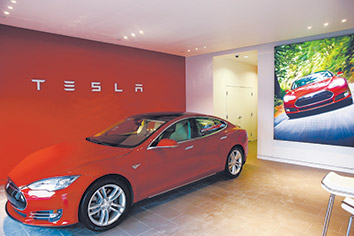Subscriber Benefit
As a subscriber you can listen to articles at work, in the car, or while you work out. Subscribe NowA senior official with Tesla Motors Inc. said the company would curtail its investment in Indiana if legislators pass a law prohibiting it from selling cars directly through its own dealerships, which it has been doing in the state since 2013.
The Palo Alto, California-based electric car manufacturer operates a sales outlet on the north side of Indianapolis at the Fashion Mall, and it plans to open a service center later this year. The company does not use franchise dealers anywhere in the world, officials said, and does not intend to do so in the event Indiana mandates them.
"If the law were changed to prohibit manufacturer sales, we would not be changing our business model to accommodate that," Diarmuid O'Connell, Tesla's vice president of business development, said in an interview with IBJ on Tuesday.
"We would simply serve our customers out of step, meaning Indiana customers and prospects would have to travel out of state to Ohio, Illinois and Kentucky to buy cars and have their cars serviced," he said.
O'Connell's comments came Tuesday before a legislative study committee meeting on a proposal introduced in the 2016 legislative session that would have mandated that dealer licenses issued to manufacturers expire 30 months after issuance, which would be late 2017 for Tesla. The bill did not pass, but lawmakers referred the issue to the study committee for additional debate.
In testimony before the study committee, O'Connell pointed out that Tesla is investing heavily in Indiana. It purchases $43 million in parts and components from Indiana companies annually, employs 25 people at its Indianapolis store and has installed four charging stations in the state.
Legislators took no action and will likely hold more meetings before deciding whether to recommend legislation for the 2017 session.
Under existing law, Tesla is allowed to sell its high-five-figure and low-six-figure-priced cars directly to consumers—as long as it isn't competing with third-party affiliates selling those same automobiles.
Dealers and carmakers including GM expressed support for the 2016 bill, which was introduced by State Rep. Kevin Mahan, R-Hartford City. Among other reasons, proponents said they want a "level playing field" as Tesla gears up to introduce its Model S cars with price tags between $30,000 and $40,000 next year.
"When Tesla was made for the 1 percent, we handled the 99 percent," Trevor Vance, who represents the Alliance of Automobile Manufacturers, told legislators at the committee hearing Tuesday. "Now that they want to start making a half-million cars a year, we think that the general public or the other 99 should be protected under our state franchise laws."
This is not the first time Tesla has faced opposition with its direct-to-consumer model. Michigan in 2014 passed a law banning manufacturers from selling their own vehicles. Texas has a similar law on the books. Virginia and New York have caps on the number of sales stores Tesla can operate, according to various media reports.
O'Connell, the Tesla executive, said the company has opted for a direct-distribution model partly because it believes third-party affiliates are not "prepared or incentivized to promote this new technology."
"The result of that would be higher costs, because presumably those dealers would want to make some profit," O'Connell said, "and probably poorer service and poorer customer care, because we have a much more pronounced incentive to take care of our first-generation customers than the middlemen."
Tom Kelley of Kelley Automotive in Fort Wayne said he'd be happy to sell Tesla cars as a third-party dealer, but continuing to permit direct-to-consumer sales could negatively affect consumers and dealers.
He touted the importance of car buyers being able to deal with local franchise owners as opposed to an out-of-state corporations, in areas including record-keeping and complaints. He also noted that foreign automakers could follow Tesla's example and sell directly to the masses, undercutting the economic impact local dealers provide the state.
"We're not talking about Tesla—we're talking about any manufacturer," Kelley said in remarks after the committee hearing. "And if manufacturers decided to come here from China or India or somewhere like that and sell direct, they would affect us in great way, I believe."
Kelley said he believes the trend would spur existing American manufacturers to follow suit.
As Tesla seeks to upend a decades-old business model, it has urged its customers to testify on its behalf at legislative hearings across the country. A few showed up at Tuesday's meeting, including Indianapolis real estate agent Mitch Rolsky, who described the potential legislation as "an unnecessary contemplation of change."
At one point, as he ridiculed the law's advocates for trying to protect market share under the veil of protecting consumers, committee chairman State Rep. Ed Soliday, R-Valparaiso, told him to "be very careful."
"I'm taking this as a reflection on the integrity of the committee," Soliday said.
Soliday, who's been steeped in the direct-sales issue for months, said he hopes the opposing parties can reach common ground. He said the world is changing, but suggested it may be unwise take a loose, buyer-beware approach with this issue.
"We're going to do a public policy for the future, not for Tesla. And if we're going to take an approach with caveat emptor with car sales, the second-biggest thing that most people buy, then we can wipe out a whole lot of code this year."
Please enable JavaScript to view this content.

